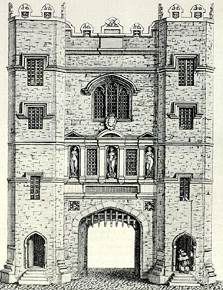Judgement
Judgement was not given until the end of the quarter session or assize, when the prisoner was again called to the bar and asked for his or her response to the verdict (the "allocutus"):
"Now, what can you say for yourselves why according to law you should not have judgement to suffer death? What sayest thou, N or M?" (fill in your own name, or Falstaff's).
At this point, judgement might be suspended for a pregnant woman, benefit of clergy* requested, or a pardon granted. Judgement was also sometimes reversed owing to a trivial error in the wording of the indictment*.
The sentence
Failing a reprieve, a pardon, or some technical quibble in his favour, Falstaff's fate would depend upon whether the jury and judge gave him a reduced verdict (petty larceny) or convicted him of the full felony. In the first case, he would escape with only a whipping, a fine or being locked for a time in the pillory*. In the second case, he would be subject to the full force of the law as it applied to convictions for treason and felony:
You are to be drawn upon a hurdle to the place of execution, and there you are to be hanged by the neck, and being alive cut down, and your privy-members cut off, and your bowels to be taken out of your belly and burned, you being alive; and your head to be cut off, and your body to be divided into four quarters, and that your head and quarters be disposed of where [his or her] majesty shall think fit.
(The punishment is quoted from Cockburn, J.S. ed., Crime in England, 1550-1800. p. 41.)
Footnotes
-
The benefits of literacy
If Falstaff or any layman could demonstrate literacy, he could gain a reprieve as long as the crime was only a lesser felony or first conviction--Ben Jonson was able to plead benefit of clergy when he was arraigned for killing a fellow actor. An illiterate prisoner might have followed the common practice of memorizing the "neck-verse" (the passage from a psalter that was usually read as a test of literacy). (If the criminal were deemed unworthy of getting away with such a trick, the judge could choose a passage at random instead.) Statutes periodically added to a list of "non-clergyable" crimes, which included stabbing, horse-theft and burglary.
-
Off on a technicality
In 1595, a murderer was allowed to escape penalty because of contradictory descriptions in the indictment concerning the area of the thigh where the victim had been shot.
-
A compromising position
The stocks: a wooden frame with holes in which the head and hands can be locked; it was used especially for punishing serious misdemeanours such as sexual offences, treasonous speech, or certain forms of witchcraft.
